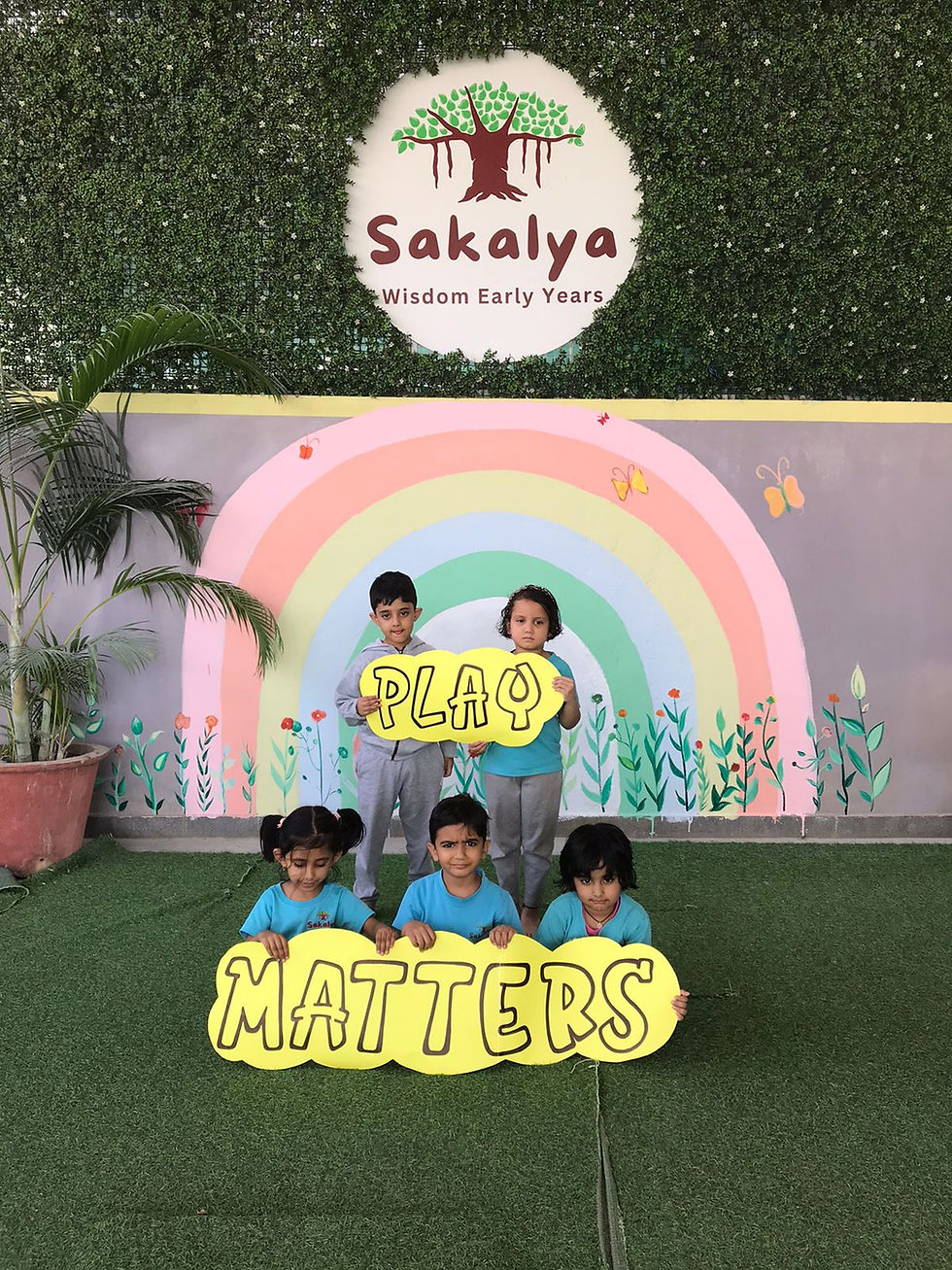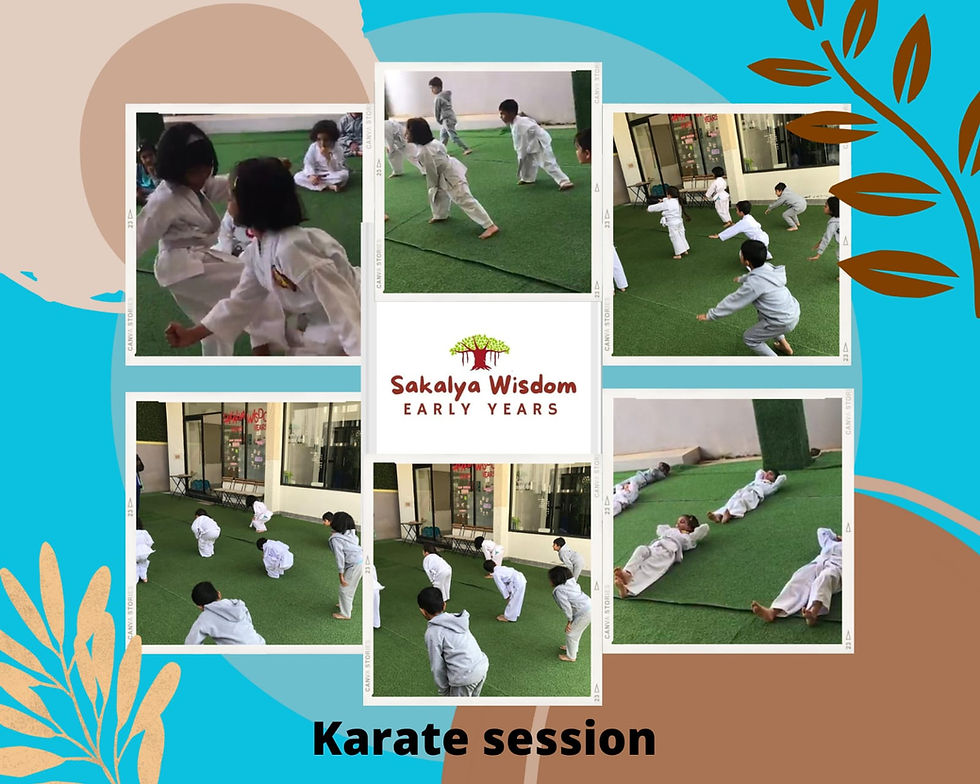Celebrating the International Day of Play at Sakalya Wisdom Early Years
- Jun 6, 2024
- 3 min read
Updated: Oct 23, 2025
Why Play-Based Learning is Essential
Yes, play-based learning is indeed the best way for children to learn during their early years and beyond. Play is not just another activity; it's a transformative way of engaging with the world. Through play, children develop critical cognitive abilities, enhance their communication skills, and build the foundational skills necessary for a bright future.
Play-based learning is highly effective in actively engaging students in the learning process. It makes learning enjoyable and relevant, which significantly boosts motivation and retention of information.
The Importance of Play
It's often stated, but not emphasized enough: children learn best through play. Play creates powerful learning opportunities across all areas of development – intellectual, social, emotional, and physical. Through play, children learn to connect with others, build a variety of leadership skills, develop resilience, navigate relationships and social challenges, and conquer their fears.
When children play, they feel safe. They use play to make sense of the world around them. Play provides a platform for children to express and develop their imagination and creativity, which are crucial skills in our technology-driven and innovative world.
International Day of Play
The first-ever International Day of Play, observed on June 11, 2024, marks a significant milestone in efforts to preserve, promote, and prioritize play so that everyone, especially children, can reap its rewards and thrive to their full potential. The theme, "Play Makes A Better World," underscores the critical role of play in shaping a happier, healthier society.
Activities for International Day of Play at Sakalya Wisdom Early Years
At Sakalya Wisdom Early Years, we wholeheartedly embrace a play-based approach. On this special day, we have planned a variety of activities to celebrate and highlight the importance of play.
Outdoor Activities
Kangaroo Jump: This fun activity will have children hopping around like kangaroos, improving their balance and coordination while having a blast.
Obstacle Race: Designed to challenge and entertain, the obstacle race helps children develop their physical skills and problem-solving abilities as they navigate through different obstacles.
Relay Race: This team-based activity promotes teamwork and communication skills as children work together to complete the race.
Indoor Activities
Skittles: This classic game helps children improve their hand-eye coordination and focus as they aim to knock down the pins.
Puzzle Solving: Engaging in puzzles enhances cognitive skills, including problem-solving, spatial awareness, and critical thinking.
Activities for Educators and Caretakers
Recognizing the importance of play for everyone, we've also planned games for our educators and caretakers. These activities aim to foster a sense of community and well-being among all participants, adopting the spirit of the first International Day of Play.
Why This Day Matters
Research indicates that only 1 in 4 children play outside regularly today, compared to their grandparents' generation, where almost three-quarters reported playing outside a few times a week. This decline highlights the need for initiatives like the International Day of Play to encourage outdoor activities and unstructured play.
Playful interactions contribute significantly to the well-being and positive mental health of parents, educators, and children. By embracing a play-based approach, we not only enhance the learning experience for our children but also support their holistic development.
Join Us in Making a Difference
At Sakalya Wisdom Early Years, we are committed to being change-makers by prioritizing play. Let's celebrate this International Day of Play with enthusiasm and joy, ensuring our children experience the myriad benefits of play.
Sakalya Wisdom Early Years is the best preschool near to the families residing in Seegehalli Kadugodi, Kannamangala, Chikkabanahalli area in Whitefield Bangalore, offering a nurturing environment where learning unfolds through exploration and experience through Project Based Learning . Recognized as one of the best early learning schools, Sakalya Wisdom is located in a nature-friendly space away from noise pollution. With spacious Montessori classrooms , this kindergarten space blends modern pedagogy with natural learning experiences. Led by an Army veteran, IIM alumnus, and Harvard-certified early education leader, Sakalya Wisdom stands apart as a thoughtful, value-driven preschool where admissions are now open for parents seeking a joyful, holistic start to their child’s learning journey in Bangalore. This best learning experience for your child cannot be at the doorstep as we believe that holistic learning happens in the calm environment in a residential layout 2 minutes from Whitefield Hoskote Main Road Admissions are now open, and we invite you to experience the difference of an education that truly nurtures your child's potential.














Comments